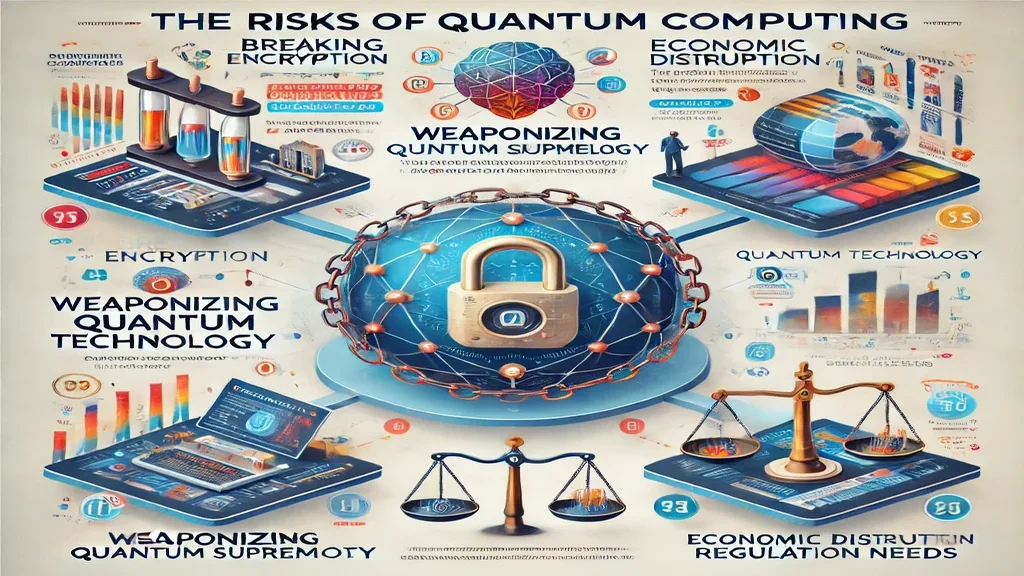Quantum computing is a form of computing that relies on small fragments, like atoms and photons, to process information in ways that cannot be done in regular computers. It’s faster and can solve certain complex problems by exploring lots of possibilities at one time.
However, with great power comes great responsibility. Many experts are issuing warnings on the dark side of quantum computing. Its promising solutions bring along serious risks. Let’s find out what risks it poses and why experts should be worried.
Covered Contents
ToggleThe Quantum Revolution: A Quick Overview
Quantum computers are very different from traditional computers. Instead of traditional bits, they work with quantum bits or qubits. The idea is to compute at unimaginable speeds for today’s technologies. What a classical computer will solve in years may be done within minutes for a quantum computer. Healthcare, finance, and AI can be enormous beneficiaries. It has, however, brought dangerous consequences as well.
Breaking Encryption: A Threat to Cybersecurity
One of the biggest fears that quantum computers bring is that they might break the current encryption methods. Encryption is what keeps our online data secure. It allows us to conduct banking transactions and send private emails safely.
Dr. Peter Williston Shor (born on August 14, 1959) developed Shor’s Algorithm, which shows how easily the quantum computer would break the RSA encryption (Rivest, Shamir, Adleman) method. RSA encryption is used to secure secret information over the internet. When quantum computers become mainstream, hackers could access such encrypted data with little effort.
According to cryptographer Bruce Schneier, born on January 15, 1963, quantum computing will make much of the encryption today obsolete. It could make cybersecurity a nightmare. Companies and governments must start preparing for post-quantum encryption methods.
The Risk of Quantum Supremacy
It’s the risk of quantum supremacy that means the quantum computer is capable of solving particular problems in time that are far beyond the reach of a classical computer. Scientifically, it is a landmark; however, it also leads to a form of imbalance.
Researcher of quantum computing Dr. Scott Aaronson warns that “quantum supremacy in the wrong hands would widen the gap between the haves and the have-nots”. The same goes for other powers so that smaller countries and organizations can hardly compete against these powers.
Equipping the Quantum Technology
Quantum technology can be armed. Quantum sensors can enhance military surveillance ability, and the quantum communication system can create secret channels that no hacker can intercept. While it has its benefits, an arms race could be the result.
According to Professor Stephen Bartlett of the University of Sydney, “Quantum technology has dual-use potential. While it can help humanity, it also poses risks if misused by militaries or rogue states.” The line between innovation and destruction becomes thinner.
Economic Disruption
Quantum computing can change the world for industries and economies. It could make jobs at levels that have never been seen before completely automated, hence efficient but making millions lose their jobs. Certain industries might face a problem if traditional computing is used.
As Economic expert, Dr. Emily Watkins said, “Quantum computing could widen economic inequality. Companies that adapt quickly will thrive, while others might collapse.” Therefore, preparing the workforce before this shift can be a great undertaking.
Ethical Challenges in Quantum Research
With any groundbreaking technology comes ethical questions. Quantum computing research is costly. This will make it inaccessible to only wealthy nations and corporations. Developing countries might be left out in this technological race.
Besides, one is questioning how transparent quantum power research is. Are we giving up security over innovation? Would the government control quantum research enough? According to the words of such experts as Professor Lisa Randall, “Without global cooperation, quantum computing could deepen inequalities and lead to ethical dilemmas.”
Need Global Regulation
Experts believe that there must be strict regulations on quantum computing. Without global agreements, the technology might become uncontrollable. International collaborations, such as the Quantum Alliance Initiative, try to address the unsaid issues. Still, development is slow.
As stated by Dr. John Preskill, one of the most prominent minds in quantum computing, “Governments must act quickly to create quantum-safe policies. The longer we wait, the harder it will be to control the technology.” The collaboration among nations is important to ensure that everyone can benefit from the science.
Preparations for a Post-Quantum World
Preparing the world for quantum will require investment in cryptography post-quantum. Organizations need to invest in post-quantum cryptography. Governments need to create policies regulating the use of quantum technology. Educating the future experts in this field is a must.
IBM, Google, and Microsoft are already working on quantum-safe solutions. The National Institute of Standards and Technology is also developing new encryption standards. These are just some of the key efforts needed to safeguard against the possible risks.
Conclusion
Quantum computing is a double-edged sword. It can optimize industries and solve global problems. But it also poses significant risks. From breaking encryption to creating economic imbalances, the dark side of quantum computing cannot be ignored.
Experts opine that there is a need to act now. Governments, organizations, and researchers must come together to solve this issue. If these issues are addressed early, then quantum computing will be a tool for good and not a source of chaos. The future is uncertain, but it can be bright with careful planning.
Inquire More
The Basics of Quantum Steganography
The Mind-Blowing Role of Quantum Computing in Daily Life



One thought on “Quantum Computing’s Dark Side: What Experts Fear the Most”